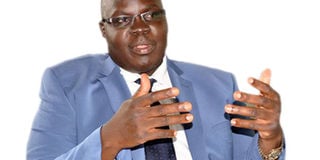Give us money, we’ll fight money laundering - FIA

Financial Intelligence Authority executive director Mr Sydney Asubo gestures during an interview. Photo by Rachel Mabala
What you need to know:
- Stopping money laundering, illicit financial flows and terrorism financing in a developing economy is no mean feat. Executive director of the Financial Intelligence Authority (FIA), Mr Sydney Asubo, opens up to Ismail Musa Ladu on why keeping a tab on the nature of transactions in the economy is of utmost importance for both the economic survival and security of the country
Stopping money laundering, illicit financial flows and terrorism financing in a developing economy is no mean feat. Executive director of the Financial Intelligence Authority (FIA), Mr Sydney Asubo, opens up to Ismail Musa Ladu on why keeping a tab on the nature of transactions in the economy is of utmost importance for both the economic survival and security of the country. Excerpts:
To what extent would you say money laundering is a significant issue for Ugandan banks?
It is a significant issue not only for the banking sector, but also for all the accountable persons and entities that have reporting and compliance obligations under the Anti-Money Laundering (AML) Act and Regulations.
For the banking sector, the issue is more significant because they are at the heart of the global financial services industry, especially the transfer of funds from different countries. They have the added responsibility of verifying the source and purpose of funds that they send or receive on behalf of their customers.
This is intended to ensure that the global financial system is not used by criminals to launder funds or to mitigate the consequences in the laundering that has already taken place. That is why all accountable persons are required to have AML policies and systems to detect any suspicious or unusual transactions/activities.
What do you think of the compliance-driven regulatory environment?
It is a good thing. Otherwise, how else would countries protect themselves from being hubs or centres for financial crime? In many cases, self-regulation has had to be supplemented by other regulatory means, from licensing authorities or disciplinary bodies, to be effective.
What kind of regulations is Uganda using to comply with requirements such as ‘Know Your Customer (KYC)’, which the US is strongly pushing for?
The global AML standards are those put in place by the Financial Action Task Force (FATF). These standards are then enforced through different means in different countries by creating the required legal and institutional framework.
Where do you see the weak spots within the Ugandan banking sector?
The main one is identifying and reporting suspicious or unusual transactions. Many banks still need to improve on the tools at their disposal to identify these transactions. Part of this is due to application of incomplete or inadequate customer due diligence measures, especially of high-risk customers (including, but not limited to, politically exposed persons).
What happens if Ugandan banks fail to comply? What do the Ugandan authorities do?
The penalties for non-compliance are contained in the AML Act 2013 (as amended in 2017), as well as the Regulations made thereunder (2015). They range from administrative sanctions to criminal sanctions.
What does it mean for Ugandan banks collaborating with correspondent banks?
As far as correspondent banking relationships are concerned, these are business relationships between Ugandan banks and their correspondents, and like all business relationships, are governed by agreed sets of rules. One of the cardinal rules is compliance with national and global AML/CFT (Counter Financing of Terrorism Act 2009) measures, breach of which could lead to termination of the business relationship by either party.
How vulnerable is Uganda in terms of being a destination or even a conduit of AML?
As established in the AML National Risk Assessment, 2017, the vulnerability of Uganda to money laundering is high.
Which sectors of the economy are most vulnerable to money laundering?
These were identified in the National Risk Assessment as real estate, unregulated micro-finance institutions and money lenders, mobile money products, forex bureaus and money remitters, advocates and precious metal and stone dealerships.
At what point do you get to know about the laundered money?
We get to know when we receive suspicious transaction reports, and sometimes large cash transaction reports from reporting entities, as well as from declarations of cash at border crossing points. We also get reports from other agencies or organs of government. Occasionally, we also get information from whistle-blowers, as well as open sources. At the international level, we exchange information with financial intelligence units of different countries.
How equipped is FIA and the country to deal with the problem of IFF and AML?
In terms of the legal framework, Uganda is well-equipped. The major outstanding issue now is to properly finance and equip the institutions involved in the fight against money laundering, for example, FIA, investigative bodies (police and Inspectorate of Government), prosecutors, and those involved in asset recoveries.
Any case of terrorism financing that you know of?
Yes. But I cannot provide details at this stage.
Do you believe there is political will to deal with money laundering and related vices?
Of course there is. That is demonstrated through some of the budget we get. So broadly speaking you would say yes. Also if you look at the laws we have in place, it measures up to the required international standards.
The only challenge I would say we have is to do with the budgetary support. But we acknowledge that we are in a developing economy and there is a lot of demand on the resource envelope.
This story was written as part of Wealth of Nations, a pan-African media skills development programme run by the Thomson Reuters Foundation in partnership with the African Centre for Media Excellence. More information at www.wealth-of-nations.org




